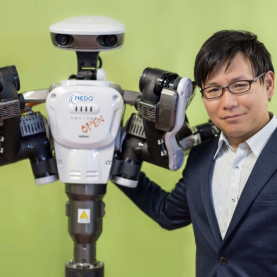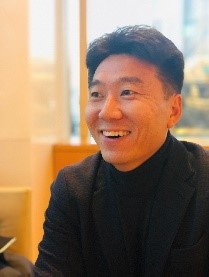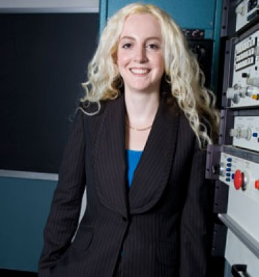Keynotes
For Humanoids 2019 we have proposed to bring an innovation in the keynote program and introduce dual keynotes on specific topics of interest for the community.
The idea of the dual keynotes is to have two scientists making individual presentations, followed by a “debate” where they both answer questions from the audience moderated by the chairperson about the topic.
We have chosen three areas : Learning, Whole-body control and Human-robot interaction.
LearningModerated by Tamim Asfour (KIT, Germany) |
|
Donghuei Lee (TUM/DLR, Germany) |
Takamitsu Matsubara (NAIST, Japan) |
 Dongheui Lee is Associate Professor of Human-centered Assistive Robotics at the TUM Department of Electrical and Computer Engineering. She is also director of a Human-centered assistive robotics group at the German Aerospace Center (DLR). Her research interests include human motion understanding, human robot interaction, machine learning in robotics, and assistive robotics. Prior to her appointment as Associate Professor, she was an Assistant Professor at TUM (2009-2017), Project Assistant Professor at the University of Tokyo (2007-2009), and a research scientist at the Korea Institute of Science and Technology (KIST) (2001-2004). After completing her B.S. (2001) and M.S. (2003) degrees in mechanical engineering at Kyung Hee University, Korea, she obtained a PhD from the department of Mechano-Informatics, University of Tokyo, Japan in 2007. She was awarded a Carl von Linde Fellowship at the TUM Institute for Advanced Study (2011) and a Helmholtz professorship prize (2015). She is coordinator of both the euRobotics Topic Group on physical Human Robot Interaction and of the TUM Center of Competence Robotics, Autonomy and Interaction. Dongheui Lee is Associate Professor of Human-centered Assistive Robotics at the TUM Department of Electrical and Computer Engineering. She is also director of a Human-centered assistive robotics group at the German Aerospace Center (DLR). Her research interests include human motion understanding, human robot interaction, machine learning in robotics, and assistive robotics. Prior to her appointment as Associate Professor, she was an Assistant Professor at TUM (2009-2017), Project Assistant Professor at the University of Tokyo (2007-2009), and a research scientist at the Korea Institute of Science and Technology (KIST) (2001-2004). After completing her B.S. (2001) and M.S. (2003) degrees in mechanical engineering at Kyung Hee University, Korea, she obtained a PhD from the department of Mechano-Informatics, University of Tokyo, Japan in 2007. She was awarded a Carl von Linde Fellowship at the TUM Institute for Advanced Study (2011) and a Helmholtz professorship prize (2015). She is coordinator of both the euRobotics Topic Group on physical Human Robot Interaction and of the TUM Center of Competence Robotics, Autonomy and Interaction. |
 Takamitsu Matsubara received the B.E.degree in electrical and electronic systems engineering from Osaka Prefecture University, Osaka, Japan, in 2003, the M.E. and Ph.D. degrees in information science both from the Nara Institute of Science and Technology, Nara, Japan, in 2005, and 2007, respectively. From 2005 to 2007, he was a Research Fellow (DC1) at the Japan Society for the Promotion of Science. From 2013 to 2014, he is a Visiting Researcher at the Donders Institute for Brain Cognition and Behavior, Radboud University Nijmegen, The Netherlands. He is currently an Assistant Professor at the Nara Institute of Science and Technology and a Visiting Researcher at the ATR Computational Neuroscience Laboratories, Kyoto, Japan. His research interests include machine learning and control theory for robotics, and its application to assistive robotics. Takamitsu Matsubara received the B.E.degree in electrical and electronic systems engineering from Osaka Prefecture University, Osaka, Japan, in 2003, the M.E. and Ph.D. degrees in information science both from the Nara Institute of Science and Technology, Nara, Japan, in 2005, and 2007, respectively. From 2005 to 2007, he was a Research Fellow (DC1) at the Japan Society for the Promotion of Science. From 2013 to 2014, he is a Visiting Researcher at the Donders Institute for Brain Cognition and Behavior, Radboud University Nijmegen, The Netherlands. He is currently an Assistant Professor at the Nara Institute of Science and Technology and a Visiting Researcher at the ATR Computational Neuroscience Laboratories, Kyoto, Japan. His research interests include machine learning and control theory for robotics, and its application to assistive robotics. |
Whole-body controlModerated by Abderrhamane Kheddar (CNRS, France) |
|
Ludovic Righetti (NYU/ MPI-IS, USA/Germany) |
Jaeheung Park (SNU, Korea) |
 Ludovic Righetti is an Associate Professor in the Electrical and Computer Engineering Department and in the Mechanical and Aerospace Engineering Department at the Tandon School of Engineering of New York University and a Senior Researcher at the Max-Planck Institute for Intelligent Systems in Germany. He holds an engineering diploma in Computer Science and a Doctorate in Science from the Ecole Polytechnique Fédérale de Lausanne, Switzerland. He was also a postdoctoral fellow at the University of Southern California from 2009 to 2012 and started the Movement Generation and Control Group at the Max-Planck Institute for Intelligent Systems in Tübingen in 2012. His PhD thesis was awarded the 2010 Georges Giralt PhD Award and he is also the recipient of the 2016 IEEE-RAS Early Career Award and the 2016 Heinz Maier-Leibnitz Prize from the German Research Foundation. His research focuses on the planning and control of movements for autonomous robots, with a special emphasis on legged locomotion and manipulation. He is more broadly interested in questions at the intersection of decision making, automatic control, optimization, applied dynamical systems and machine learning and their applications to physical systems. Ludovic Righetti is an Associate Professor in the Electrical and Computer Engineering Department and in the Mechanical and Aerospace Engineering Department at the Tandon School of Engineering of New York University and a Senior Researcher at the Max-Planck Institute for Intelligent Systems in Germany. He holds an engineering diploma in Computer Science and a Doctorate in Science from the Ecole Polytechnique Fédérale de Lausanne, Switzerland. He was also a postdoctoral fellow at the University of Southern California from 2009 to 2012 and started the Movement Generation and Control Group at the Max-Planck Institute for Intelligent Systems in Tübingen in 2012. His PhD thesis was awarded the 2010 Georges Giralt PhD Award and he is also the recipient of the 2016 IEEE-RAS Early Career Award and the 2016 Heinz Maier-Leibnitz Prize from the German Research Foundation. His research focuses on the planning and control of movements for autonomous robots, with a special emphasis on legged locomotion and manipulation. He is more broadly interested in questions at the intersection of decision making, automatic control, optimization, applied dynamical systems and machine learning and their applications to physical systems. |
 Jaeheung Park is a Professor in the Department of Transdisciplinary Studies at Seoul National University, South Korea, since 2009. Prior to joining Seoul National University, he shortly worked at Hansen Medical Inc, a medical robotics company. He received the Ph.D. degree from Stanford University, and the B.S. and M.S. degrees from Seoul National University. His research group is currently conducting many national projects on the topics of humanoid robots, rehabilitation/medical robots, and autonomous vehicle. He was a team leader of TEAM SNU for DRC Finals 2015 (DARPA Robotics Challenge Finals), which was a robotics competition for disaster response. In 2016, His team won the award given by Minister of Science, ICT, and Future Planning, at Challenge Parade that was held by the Korean Government. He has participated in organizing many international robotics conferences such as IROS, HUMANOIDS, and HRI. He has also served as a Conference Editorial Board or as an Associate Editor for many international conferences. He currently serves as a co-chair of RAS Technical Committee on Whole-body Control. Jaeheung Park is a Professor in the Department of Transdisciplinary Studies at Seoul National University, South Korea, since 2009. Prior to joining Seoul National University, he shortly worked at Hansen Medical Inc, a medical robotics company. He received the Ph.D. degree from Stanford University, and the B.S. and M.S. degrees from Seoul National University. His research group is currently conducting many national projects on the topics of humanoid robots, rehabilitation/medical robots, and autonomous vehicle. He was a team leader of TEAM SNU for DRC Finals 2015 (DARPA Robotics Challenge Finals), which was a robotics competition for disaster response. In 2016, His team won the award given by Minister of Science, ICT, and Future Planning, at Challenge Parade that was held by the Korean Government. He has participated in organizing many international robotics conferences such as IROS, HUMANOIDS, and HRI. He has also served as a Conference Editorial Board or as an Associate Editor for many international conferences. He currently serves as a co-chair of RAS Technical Committee on Whole-body Control. |
Human-robot interactionModerated by Katsu Yamane (Honda Research, USA) |
|
Goldie Nejat (UT, Canada) |
Arash Ajoudani (IIT, Italy) |
 Goldie Nejat, PhD, P.Eng. is an Associate Professor in the Department of Mechanical & Industrial Engineering at the University of Toronto, and the Founder and Director of the Autonomous Systems and Biomechatronics (ASBLab) Laboratory. Dr. Nejat is also an Adjunct Scientist at the Toronto Rehabilitation Institute. She received both her BASc and PhD degrees in Mechanical Engineering at the University of Toronto. Dr. Nejat is a world renowned expert in developing intelligent service/personal robots for applications in health, elderly care, emergency response, search and rescue, security and surveillance, and manufacturing. A major goal of her research is to develop and integrate intelligent socially assistive robots for assistive human-robot interactions (HRI) in healthcare facilities, private homes and for high stress and dangerous jobs. Dr. Nejat’s research is leading the development of intelligent assistive robotic aids that can meet the challenges posed by an aging population. She collaborates with international researchers, healthcare experts and healthcare facilities to develop robots and devices that can be effectively transferred and integrated into people’s everyday lives. Dr. Nejat is helping to change the face of robotics and her work is at the forefront of robotics research. Her research is constantly pushing the envelope of the capabilities of current robots. In 2008, Dr. Nejat received an NSERC University Faculty Award. She also received the 2012 Professional Engineers of Ontario Young Engineer Medal and the 2013 Engineers Canada Young Engineer Achievement Award, both awards are for her exceptional achievements in the field of robotics at a young age. Goldie Nejat, PhD, P.Eng. is an Associate Professor in the Department of Mechanical & Industrial Engineering at the University of Toronto, and the Founder and Director of the Autonomous Systems and Biomechatronics (ASBLab) Laboratory. Dr. Nejat is also an Adjunct Scientist at the Toronto Rehabilitation Institute. She received both her BASc and PhD degrees in Mechanical Engineering at the University of Toronto. Dr. Nejat is a world renowned expert in developing intelligent service/personal robots for applications in health, elderly care, emergency response, search and rescue, security and surveillance, and manufacturing. A major goal of her research is to develop and integrate intelligent socially assistive robots for assistive human-robot interactions (HRI) in healthcare facilities, private homes and for high stress and dangerous jobs. Dr. Nejat’s research is leading the development of intelligent assistive robotic aids that can meet the challenges posed by an aging population. She collaborates with international researchers, healthcare experts and healthcare facilities to develop robots and devices that can be effectively transferred and integrated into people’s everyday lives. Dr. Nejat is helping to change the face of robotics and her work is at the forefront of robotics research. Her research is constantly pushing the envelope of the capabilities of current robots. In 2008, Dr. Nejat received an NSERC University Faculty Award. She also received the 2012 Professional Engineers of Ontario Young Engineer Medal and the 2013 Engineers Canada Young Engineer Achievement Award, both awards are for her exceptional achievements in the field of robotics at a young age. |
 Arash Ajoudani is a tenure-track researcher and the leader of the Human-Robot Interfaces and physical Interaction (HRI²) lab of the Italian Institute of Technology (IIT). He received his PhD degree in Robotics and Automation from the University of Pisa and IIT in 2014. His PhD thesis was a finalist for the Georges Giralt PhD award 2015 (best European PhD thesis award in robotics). He was a winner of the European Research Council (ERC) starting grant 2019, of the Amazon Research Awards 2019, of the Solution Award 2019 (MECSPE2019), of the Werob best poster award 2018, of the KUKA Innovation Award 2018, a finalist for the best conference paper award at Humanoids 2018, a finalist for the best interactive paper award at Humanoids 2016, a finalist for the best oral presentation award at Automatica (SIDRA) 2014, the winner of the best student paper award and a finalist for the best conference paper award at ROBIO 2013, and a finalist for the best manipulation paper award at ICRA 2012. He is the author of the book “Transferring Human Impedance Regulation Skills to Robots” in the Springer Tracts in Advanced Robotics (STAR), and several publications in journals, international conferences, and book chapters. He is currently serving as the executive manager of the IEEE-RAS Young Reviewers’ Program (YRP), chair and representative of the IEEE-RAS Young Professionals Committee. He has been serving as a member of scientific advisory committee and as an associate editor for several international journals and conferences. His main research interests are in physical human-robot interaction and collaboration, robotic manipulation, robust and adaptive control, assistive robotics, and tele-robotics. Arash Ajoudani is a tenure-track researcher and the leader of the Human-Robot Interfaces and physical Interaction (HRI²) lab of the Italian Institute of Technology (IIT). He received his PhD degree in Robotics and Automation from the University of Pisa and IIT in 2014. His PhD thesis was a finalist for the Georges Giralt PhD award 2015 (best European PhD thesis award in robotics). He was a winner of the European Research Council (ERC) starting grant 2019, of the Amazon Research Awards 2019, of the Solution Award 2019 (MECSPE2019), of the Werob best poster award 2018, of the KUKA Innovation Award 2018, a finalist for the best conference paper award at Humanoids 2018, a finalist for the best interactive paper award at Humanoids 2016, a finalist for the best oral presentation award at Automatica (SIDRA) 2014, the winner of the best student paper award and a finalist for the best conference paper award at ROBIO 2013, and a finalist for the best manipulation paper award at ICRA 2012. He is the author of the book “Transferring Human Impedance Regulation Skills to Robots” in the Springer Tracts in Advanced Robotics (STAR), and several publications in journals, international conferences, and book chapters. He is currently serving as the executive manager of the IEEE-RAS Young Reviewers’ Program (YRP), chair and representative of the IEEE-RAS Young Professionals Committee. He has been serving as a member of scientific advisory committee and as an associate editor for several international journals and conferences. His main research interests are in physical human-robot interaction and collaboration, robotic manipulation, robust and adaptive control, assistive robotics, and tele-robotics. |
